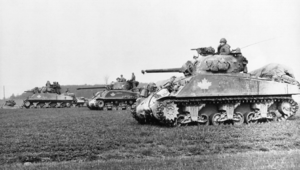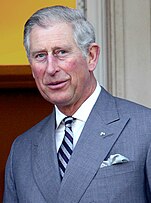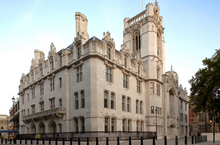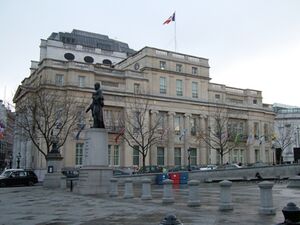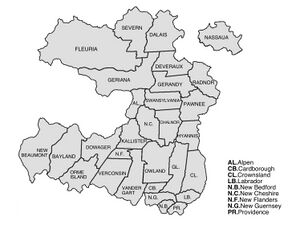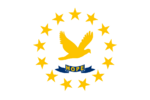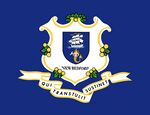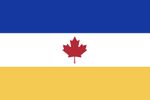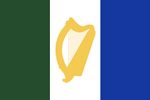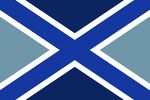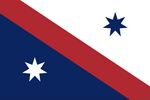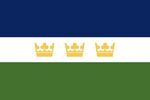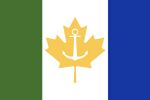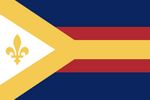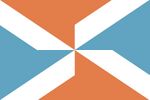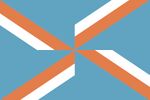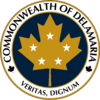Delamaria: Difference between revisions
| Line 797: | Line 797: | ||
==Economy== | ==Economy== | ||
{{main|Economy of Delamaria}} | {{main|Economy of Delamaria}} | ||
As of | As of 2023 Delamaria is the 8th [[List of countries by GDP on Eurth|largest economy]] on [[Eurth]], and the second in Argis. The nation boasts large production centres, though it is a primarily service economy, partly as companies were incentivised to use automation rather than labour, as working conditions laws became stricter under the [[Stephen Milbank|Milbank government]], and state grants for technologies became more common. Today the nation is home to some of the world's largest companies, though much of their operations are conducted overseas, Delamaria's openness towards big business is a driving factor for businesses moving to many of Delamaria's major business hubs, such as [[Labrador]], with [[Yorkerdam]] and [[Alberta]] also boasting large business districts. The government tries to keep out of the way of business, as many acts of congress have limited the state's power over private enterprise, however the government does have rules regarding mergers and monopolies, of which none have ever been effectively formed, furthering competition leading to lower costs and better quality products. | ||
===Science and Technology=== | ===Science and Technology=== | ||
Delamaria has been a leading force of scientific research and technological advancement, mostly due to fierce competition within the private sector, that has made Delamaria's citizens some of the healthiest, most intelligent, and having one of the best standards of living. Delamaria maintains a small space program, though it has yet to send a person into space, it has sent hundreds of satellites into orbit, primarily for telecommunications, internet and entertainment purposes. | Delamaria has been a leading force of scientific research and technological advancement, mostly due to fierce competition within the private sector, that has made Delamaria's citizens some of the healthiest, most intelligent, and having one of the best standards of living. Delamaria maintains a small space program, though it has yet to send a person into space, it has sent hundreds of satellites into orbit, primarily for telecommunications, internet and entertainment purposes. | ||
Revision as of 17:34, 3 June 2023
United Kingdom of Delamaria | |
|---|---|
| Motto: Veritas et Dignitas Truth and Dignity | |
| Anthem: Ode to Delamaria | |
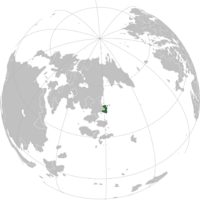 | |
| Capital | Labrador |
| Official languages | Anglish Lysian Iwenish |
| Recognised national languages | Brux |
| Recognised regional languages | Dolch, Idahan, Wiscan |
| Ethnic groups (2020) | 87% Occidental-Buranian, 4% Azanian Delamarian, 2.6% Northern Native |
| Religion (2020) |
|
| Demonym(s) |
|
| Government | Federal Parliamentary Constitutional Monarchy |
• King | William V |
| Philip Campbell | |
| Legislature | Parliament |
| Senate | |
| House of Delegates | |
| Independant Colonies unified in 1825 | |
• Formation of the Four Colonies | 1640-1702 |
• Colonies Gain Independence | 1798 |
• Treaty of Yorkerdam | 1801 |
• Confederation | 1819 |
• Treaty and Constitutional conference of Alberta | 1825 |
| 1852-1865 | |
• Annexation of Nassaua | 1856 |
• End of Monarchy | 1911 |
• New Constitution and Restoration | 2023 |
| Area | |
• | 135,000 km2 (52,000 sq mi) |
| Population | |
• 2023 estimate | 41,078,000 |
• Density | 297/km2 (769.2/sq mi) |
| GDP (nominal) | 2023 estimate |
• Total | 1,606,560,000,000 (8th) |
• Per capita | 39,110 (13th) |
| Gini (2021) | 55.9 high |
| HDI (2018) | 0.82 very high |
| Currency | Labrador Pound (LBP) |
| Time zone | UTC +00:00 |
| Date format | dd/mm/yyyy AD |
| Driving side | right |
| Calling code | +11 |
Delamaria, officially the United Kingdom of Delamaria (Lysian:Royaume Uni de Delamaria), is a country located in Argis on Eurth, its neighbours Fravina to the north and Bruxenburg to the west, and is near to Velaheria and Stedoria to the west, Dolchland to the south, and the Adlantic Ocean to the East. Made up of 40.1 Million Delamarians it comprises of both colonial and native people groups, primarily from Anglish heritage as well as Lysian, also with areas of both Iwenish and native majorities.
Colonies first were founded in the late 15th to 16th centuries, by europan powers, disregarding the current native populations who migrated to the central regions of the nation. The first colony, Henrytown, is located near present day Cape Hope, Providence , but the settlers would later move to the new colony of Rhodeport as their crops failed. The Dominion of Labradoria of the Anglian Empire and the Colony of Lysian Columbia of the Lysian Empire were the two primary colonial powers, however both of the colonies gained independence in the 18th century and quickly became regional rivals. This rivalry culminated in the Delamarian War of 1804, in which Labradoria was victorious. The fallout of the war led to the foundation of Delamaria, with the first constitutional conference taking place in 1825, and the Commonwealth being formally established on June 1st, 1825. Delamaria would thrive in the following decades, establishing its presence in the eyes of the wurld. In 1852 the Empire of Delamaria was established with reigning monarchs. However after the death of the first Emperor, the new Emperor George Alexander II, looked to expand monarchal power and wage wars of conquest, this quickly led to him being overthrown and a constitutional monarchy restored.
Through to the 20th century, Delamaria grew its economy and government exponentially, the 1910 election led to the end of the consititutional monarchy and an elected head of state imposed in 1911, leading to much hope among the population, however economic downturn in the 1920s led to many becoming acquainted with the National Party, a fascist group bent on restoring Delamaria's power. In 1932 Howard McMadden of the National Party was elected president and quickly solidified his control over the country by destroying democratic institutions and arresting judges, journalists, congressmen and writers. By 1948 however general unrest had reached a tipping point and when McMadden suffered a stroke, his vice president William Charleston took over and began to undo McMadden's work. This nearly led to a civil war after McMadden's recovery however he was assassinated and his cause crumbled. Delamaria soon after fought in the First Argic War on the side of the Periphery Alliance and was a founding member of the AN. Delamaria soon after fought in the Second Argic War on the same side and emerged victorious. Delamaria fully embraced market capitalism in the 1980s under President Robert Conover, and massively increased Delamaria's international reach. President George Cafferty led Delamaria in the 1990s and 2000s, and greatly improved education and infrastructure, whilst also presiding over the 2003 Yorkerdam Attacks and the subsequent Anti-Terror campaign, which would later lead to his resignation over unsanctioned assassinations. In 2020 the November 22nd Attacks took place, killing President Pierre Monroe and rising Deborah Van Roose to the presidency. In 2022 and 2023 a series of crises led to northern states declaring independence, this was seen as a failure of the 'Trudeau Government', where politics was increasingly dominated by the security services. A subsequent military intervention led to a constitutional convention and monarchy referendum which restored the monarchy and the prime ministry.
Delamaria is a Federal parliamentary constitutional monarchy, its head of state is the hereditary monarch, currently William V. The parliament is elected by the people to the Senate and the House of Delegates. The current governing party is the Liberal Conservative Party. Delamaria's capital is the city of Labrador. The three largest settlements are Yorkerdam, Alberta and Labrador. Delamaria is an active member of ATARA and the Assembled Nations, also maintaining membership in the Eastern Argis Trade Zone. Delamaria maintains good relations with most of the wurlds nations, especially democracies and those with similar foreign policy objectives. Delamaria often intervenes through support in foreign conflicts such as the recent Sentist War.
Etymology
Delamaria is thought to have been named after Georges LaMaria an explorer who wrote about the coastline of Delamaria prior to proper settlement. The scholar John Paul Jacques, one of the founders of Cape Hope, declared the land Delamaria in the memory of Lamaria, who was a family friend. However a New Chester University paper states that early settlers named the land in memorly of a Henry Delamare, the supposed captain of a settling ship who died in the corse of transporting them, however this is disputed.
Geography
Delamaria is located in Eastern Argis along the Adlantic seaboard. It has a land area of 135,000km2, making it narrowly larger than its neighbour Fravina. Delamaria features numerous topographically distinctive regions. The large coastal plain of the Adlantic Ocean spans across the coastal regions of the country, with hills mostly present inland and in certain regions such as Kingsland and Terra Nova. Early settlers to Delamaria were particularly surprised by the large forest ranges that cover most of the country. Despite heavy logging since settlement, Delamaria remains one of the most heavily wooded nations in the wurld thanks to many government tree planting initiatives since the early 1800s.
Inland, especially in the Midlands, terrain can be quite mountainous, with the tallest mountain in Delamaria, Mount White, reaching 4,671 feet.
Climate
Lua error in Module:Navbar at line 58: Invalid title .
History
Indigenous Population
The indigenous population of Delamaria consists of the Idaha and Jonjava nations as well as the Wiscan tribe. These peoples originated from northern Argis, often coming into conflict with Dolch and Geltic peoples in the region. The native peoples lived largely nomadic lives, raiding and pillaging Dolchic settlements for centuries, making the area known to the Dolch as Dunspelut, meaning the land of the dark spear people.
The shared identity of native delamarians formed in the 18th century as treaties were first signed with major tribe groups by Europan colonies. First indigenous groups in Delamaria arrived in around 2500-2000 BCE. Initial contact between certain coastal tribes and Europan explorers and settlers was peaceful and trading relationships between small colonies and tribes were common. However as settlements became larger and more populous, settlers began expanding outwards constructing farms on land claimed by tribes, this lead to the Kartha War of 1699, which lead to the extinction of the Kartha people.
Europan Settlement
When Delamaria was first discovered by Europan explorers it was named Lysian Columbia by the Lysian explorer Louis Boneparte, though a few years later Anglish settlers declared the land Labradoria, and in 1566 the Dominion of Labradoria was established by the Anglian Empire.
In the early days of colonization, many Europan settlers were subject to food shortages, disease, and attacks from Native tribes. Native Delamarians were also often at war with neighboring tribes and Europan settlers. In many cases, however, the natives and settlers came to depend on one another. Settlers traded for food and animal pelts; natives for guns, tools and other European goods. Natives taught many settlers to cultivate their crops. Europan missionaries and others felt it was important to "civilize" the Native Delamarians and urged them to adopt Europan agricultural practices and lifestyles. However, with the increased Europan colonization of Delamaria, the Native peoples were displaced and often killed. The native population of Delamaria declined after Europan arrival for various reasons, primarily diseases such as smallpox and measles, of which the Europans had built resistance to the diseases, whilst they were new to the native people.
Many settlers were inticed by a number of economic speculative bubbles such as the fur trade, exotic plant trade as well as the construction boom in the late 18th century. Major exports of early colonies were flowers, fur, vegetables native to the new world as well as tobacco.
Colonial Era
Three nations lied in what is now Delamaria, predominantly Lysian Columbia and Labradoria. Labradoria was a constitutional monarchy under the House of Bohun-Odell, a cadet branch of the House of Odell, which ruled with 6 monarchs from 1704 to 1819.
Prior to its independence Labradoria was a Royal Dominion of Great Anglia, with a hereditary Vice Roy as its leader, which would initially be appointed by the Anglian monarch, the first Vice Roy was William Bohun-Odell, the nephew of the Anglian Monarch through his sister. In 1766 an independent Unitary Kingdom was declared with the Bohun-Odells as its ruling house, this lead to Anglian loyal soldiers stationed at Fort Meyer attempting to seize power by taking the political and military leaders meeting in Felderling hostage, with an illequipped force left without leadership failing to take control of Beaumont Palace where the hostages were being kept, an appeal was sent to local militias to help break through the defencive structures built around the palace, the largest militia nearby was the Vandergart Republican Army, lead by Charles Landstadt. Landtstadt succesfully broke into the Palace and rescued the hostages with minimal casualties, an order was sent to kill the hostages only minutes prior to their rescue, though the soldiers guarding them were afraid they would be later tried for doing so. After this many republican sentiments were still prevolent, despite the republican leadership working with the monarchists. A major republican faction known as the Pan-Delamaric Republican Party had thousands of members and threatened to overthrow the new monarchy. Therefore in 1780, only months after his coronation, King Frederick I issued the Democratic Proclomation, granting major powers to the Governor-General, and expanding voting rights to most men and some upper class women. The Proclomation also significantly decreased the powers of the nobility, rendering their positions to mere titles, without any real control over the lands within their domains.
Confederation
In 1819 Lysian Columbia joined the Federation, into the 2nd Federation of Delamaria. With this King Charles of Lysian Columbia abdicated and ended the monarchy, in return for keeping his possessions. In 1825 the Constitutional conference of Alberta took place, officially forming the Commonwealth, and establishing elections, though only male landowners could vote initially. Albert Pritchett was the first President of Delamaria, though he was chosen to be the president at the conference, he won the first election with 89% of the electorate. In 1824 the constitution was amended and the Commonwealth was formed. At the same time the office of president was weakened with the creation of the office of prime minister.
Empire
In 1852 Nicholas Harrison was elected President of Delamaria. Prior to the formation of Delamaria Harrison was a monarchist and advocated for Delamaria to be an Empire, remaining under the House of Bohun-Odell which had ruled the Kingdom of Labradoria. Harrison said that he supported the idea of Delamaria becoming a constitutional monarchy during his Presidential Campaign, however he never said that he would go ahead with the idea. Later in 1852 he invited the then Grand Baron of Wittelsburg-Hampdorf, and head of the House of Bohun-Odell, George Alexander Bohun-Odell to Pritchett House to discuss the possibility of restoration.
In December 1852 the Empire was proclaimed with George Alexander as Emperor and King of Labradoria. Philipe of Briselle, the grandson of King Charles of Lysia Columbia, was proclaimed the new King of Lysian Columbia. The proclimation was recieved with mixed opinions both domestically and internationally. With a majority of public support in Delamaria based on belief that this would improve the economic situation, which had been worsening since the 1830s. Some republics around the wurld expressed distain for this, as Delamaria was previously a prime example of a democratic state. President Harrison subsequently became Prime Minister.
The new Empire had major overseas expansionist ambitions, setting up several Colonial Companies, which claimed lands from Alharu to Thalassa for Delamaria, though the Emperor was keen to keep the peace in Argis. In 1856 Delamaria annexed the Kingdom of Nassaua, later proclaiming it the Duchy of Nassaua as a constituent state of the empire. This was seen as a great victory domestically, and was heavily lobbied for by Delamarian trading companies, which had faced tarriffs in Nassaua.
Upon the death of George Alexander in September 1865, his son George Alexander II was crowned the new Emperor. George, who saw his father was a weak leader, and continuously told his father to persue expansionist policies such as an invasion of Fravina and the Brux lands between Delamaria and Velaheria, immediately began putting his plans into action. Within the first week of hsi reign he gathered political and military leaders to begin persuing his ambitions. King Philippe of Lysian Columbia objected to George Alexander's plans, and didnt allow Lysian Columbian forces to partake in George Alexanders plans. This enraged the new Emperor, who quickly marched his armies to Briselle and Alberta, and imposed martial law in the region, whilst declaring himself King-Protector of Lysian Columbia, stripping Phillipe of his title and forcing him into exile.
By the beginning of November public opinion was against the Emperor, and disgruntled generals within the army posed a threat to George Alexander's rule. Realising this, he sent a loyal force to the army headquarters in New Bedford, to round up several generals George Alexander believed to be conspiring against him. This outraged much of the military high command, which later ordered their armies to stop preparing for George Alexander's war, and march to Felderling, where they would confront the emperor. President Harrison also joined their cause, after Imperial Proclomations slowly stripped him of his power, leaving him a democratically elected figurehead.
Once they reached Felderling the palace was in panic, and George Alexander was forced by his loyalists to approach the army quickly surrounding the palace, and surrender himself. Though the army initially had little intention to depose the Emperor, Prime Minister Harrison, who was travelling with a few generals, convinced them that they should take advantage of his surrender to reimpose the status quo of before Imperial rule. However there were still loyalist sentiment across the country, and a complete abolition, and possible imprisonment or execution as some extremists called for, would have likely lead to civil conflict. Therefore George Alexander would be forced to abdicate and his close family was barred from reigning, however the Bohun-Odell's would be allowed to retain the Grand Barony of Wittelsburg-Hampdorf.
20th Century
Reform
In the ealy 1900s the Prime Minister of Delamaria was Arthur Bycombe of the Liberal Party. Bycombe was the leader of the laissez-faire movement of the late 19th century referred to as Ledsonianism, named after previous liberal prime minister George Ledson. However a growing movement in the liberal party lead by Randolph Cabot was vocal in its demands for reform. In the past years growing evidence had proved that poverty was worsening under Ledsonianism, and that intervention was needed. In 1806 Bycombe announced that he would resign before the next election in 1907, this lead to a fierce contest for the leadership between Cabot and the Ledsonians, ultimately Cabot won with a small majority in the Quimby Club, promising to resign if his policies werent succesful in delivering a majority in parliament. Cabot won the election with a slightly reduced majority in seats, but significantly more support from the working class and a series of reforms soon took place, notably in education, public health and working conditions.
In 1909 Queen Georgia died, leading to the unpopular and corrupt George II taking the throne. The new King was unkeen on Cabot's reforms and often considered dismissing his government. In 1910 the King attempted to dismiss two cabinet ministers he saw as too radical, leading to a constitutional crisis. Though the King had the right to dismiss ministers, by convention it only occurs on the advice of the Prime Minister. Public opinion soon shifted against the King, and calls were made for him to abdicate. After a long conference in Wolfguard House it was decided that an election would be called, and the result determining whether the monarchy would be abolished. The United Conservative party was staunchly against abolition, and campaigned instead to force the King to abdicate. However the 1910 election saw another liberal victory, and in 1911 the Abolition of the Monarchy Act was passed, dismantling not only the monarchy but the peerage itself, the Senate was to be entirely elected, noble titles were to be removed of all powers and privlidges, and the head of state would be made to be an elected President. However the aristocracy would remain highly influential in public and political life.
Economic Boom and the Tarrif Crash
Since the 18th century Delamaria had been a centre for industry in Argis, becoming one of the first to industrialise on the continent. This is largely due to its status as a colony of Great Anglia, the birthplace of the Industrial Revolution, which lead to great technological advancements, large infrastructure projects and a strong industrial sector, financed and supported by Great Anglia. Massive industrialisation had brought millions out of poverty, and increased standards of living beyond that of most other countries, the stock market boomed, and society was more mobile than ever.
By the 1910s exports to Great Anglia was the lifeblood of the Delamarian economy, which largely consisted of iron and coal mining, steel and oil production, shipbuilding and other industrial equipment. Production efficiency was maximised by industrialists, allowing Delamarian products to undercut Anglian counterparts in price. This lead to economic problems in Great Anglia, and the government decided that to mitigate this, tarrifs would have to be imposed. News of the decision reached Labrador on March 21st, 1921, and the stock market crashed within hours, weeks before any actual tarrifs were imposed, the 21st of march would soon come to be known as Black Monday. Once tarrif acts were passed in Anglia Delamaria's industrial sector collapsed, Anglia made up a majority of Delamaria's export market, and unemployment rose to nearly 3 million. Support for the government collapsed as the economic crisis worsened, and after the 1922 election, the Social Labour Party formed its first government under Prime Minister Joseph Sternkey, though relying on support from liberal and independent MPs. At the time it was believed that Social Labour would take the place of the liberals as one of the two dominant parties, however their premiership's failure lead to them returning to the small parties. The socialist government began a series of nationalisations, first of iron and steel companies, then rail and later electricity and oil. It was believed that government control could improve production efficiency and standards, and improvements were made in rail and mining, however the enormous cost of purchasing the industries left the government peniless to improve wages, and the unions that came together to form the Social Labour Party declared a general strike in 1925 to protest low wages. The government soon lost the confidence of the liberals and independents maintaining its majority in congress, and the house voted to call another election. The election of 1925 saw the liberals return to power, with new Prime Minister Vernon Peterham promising economic renewal though redevelopment of industrial cities, this policy failed and Peterham resigned in favour of Austin Madley who also failed to deliver economic growth, though food prices were brought down.
In 1928 the United Conservative Party returned to power under Thomas Crowhurst, who was forced to resign but four months later due to misappropriation of redevelopment contracts. Crowhurst was replaced by John Stancaster-Pewlett, the heir to the Pewlett Quayle fortune and an avid sailor. Stancaster-Pewlett notably held only one cabinet meeting in his two year term, and preferred to spend his days at the family estate at Cape Hope, rather than govern in Labrador. Remarkably his premiership is regarded as a success economically, as the areas worst hit by poverty rose to the national average, however he is criticised for failing to stop the rising nationalist movement.
Nationalist Regime
In 1930 an election was called, and the National Party won in a major upset, the national party lacked a clear ideology, and only promoted extreme solutions for the country's problems. From 1922 to 1930 they had only held 10 seats in congress and were seen as a fringe group. However under a first-past-the-post system, they only required a plurality of votes per constituency and not a majority, which was especially beneficial as the other parties fragmented into factions running multiple candidates under the same party in the same constituency. The result of the election was a shock to all, especially the National party, who were had no intention to form a government, and had no cabinet prepared. The nationalist Prime Minister was Edwin Skye, a controvercial figure, who blamed Delamaria's economic problems on immigrants, native Delamarians, and foreign conspiracies. His four year term saw major economic upheaval which proved popular among the working class.
The 1932 Presidential Election saw Howard McMadden come to power in a close election. McMadden was the younger brother of liberal president Richard McMadden, who unsuccessfully attempted to empower the previously semi-ceremonial position of President. Howard however had the support of a majority in congress and used this to abolish the Prime Ministership, and establish the President as the head of state and government, and removed the requirement for the cabinet to be made up from members of congress. In 1934 McMadden famously dismissed his entire cabinet after fears that they were plotting against him. The 1934 congressional elections demonstrated that the public didn't support the McMadden administration after a series of public failures and further economic downturn.
Soon after McMadden established a secret police called the Central Bureau, nicknamed the Cenbe, it arrested hundreds of political opponents and criticts of the government. The 1936 Presidential Election was heavily in favour of McMadden's opponent Joseph Rippen, however Rippen was arrested on trumped up charges of corruption, and results from several states werent accepted as legitimate. Protests broke out across the country, and the Westcourt fire of 1937 burned down three government buildings. In response McMadden increased the military's power over law enforcement, and martial law was declared in many areas. In 1938 McMadden began a plan of 'ethnic stabilisation' to remove the country of its native population, this was conducted through mass deportations, and the removal of citizenship and rights from native Delamarians. Soon after immigrants who couldnt prove Anglian or Lysian ancestry were moved to temporary towns, where disease and violence took hold.
The 1940 election was cancelled by McMadden to increase his power over Government, and many non loyal members of congress were removed from their positions and sometimes arrested. As well in 1940, McMadden seized the assets of many corporations, he had disagreements with many powerful industrialists, which culminated in a 1939 plot to overthrow McMadden and reinstate a democratic regime. In 1947 McMadden suffered from a heart attack, putting him in critical condition in hospital in Eastminster. This lead to Vice President William Charleston, who had become silently critical of McMadden's rule, taking control of the government, and reversing many of his policies, notably attempting to disband the Central Bureau and releasing political prisoners. As acting President he faced pushback from the military, though he recived popular support from the people of Delamaria and the wealthy, who's power had been deminished under McMadden's. In August of 1947 McMadden was enraged by Charleston's actions and was healthy enough to leave hospital. McMadden, along with Army General Hugh Jannsen, attempted to take control of Labrador, with tanks and troops surrounding government buildings in the capital as well as several major cities. Charleston, with the support of the Commonwealth Guard and the populace, fought back against the attempted coup, leading to shootouts in the streets of Labrador, as well as skirmishes around the country.
In December of 1947, McMadden was shot and killed by an assassin at his base of operations in New Bedford. Without McMadden his cause crumbled, and most high ranking members of his coup were arrested, as the government couldnt afford to arrest the army that supported him. Through 1948 the National Party was dismantled and sympathies against it were heavily discouraged by the government. The Central Bureau was broken apart, however most of its employees would later work for the DSS.
Though instability and resistance was expected by the temporary provisional government, the nation soon stablised and normalised its relations with the rest of the Wurld. Institutions such as Congress were reinstituted, and political prisoners were soon released. With the help of the army, small pockets of resistence were soon crushed and a period of normalisation began. The new government benefited heavily from the increased industrial and military expansion of the McMadden regime, which would soon help in the coming First Argic War.
First Argic War
Only a year after the collapse of the nationalist government and the beginning of reconstruction, President William Charleston pledged to join the Periphery Alliance and declare war on the Central Argic Powers, setting the stage for Delamaria's entry into the First Argic War.
Interwar Period
After the end of the first argic war in 1954, Prime Minister Penwright announced his resignation, stating that Delamaria could now enjoy a free democratic society once more. The 1954 election was won by the the liberals and Felix Carcan became Prime Minister. Under the Carcan government civil society returned to normal, and reforms to the government began, notably in the form of state health and housing. The Delamarian Health Service was founded in 1956, providing healthcare free of charge to Delamarian citizens. The Carcan government also began an ambitious house building project, with demand for new housing well over a million in 1954. The Department for Housing and Urban Affairs was formed by the State housing Act of 1955, and suburbs surrounding major cities blossomed.
However the Delamarian economy was struggling after the war and the McMadden regime, and debt soon spiralled out of control at enormous cost to the country's economy, and inflation started to mount. The liberals lost the 1958 election to Logan Leckhampstead of the Uniteds. Leckhampstead promised that the health service and building projects wouldnt be abolished, however tighter controls on spending was instituted to ease the economic strife. Leckhampstead however was forced to break his promise on not cutting the DHS due to overwhelming demand, and services such as state opticians were cut. This proved highly unpopular, and Carcan returned as Prime Minister in 1962, though he did not reinstitute optical services. The second Carcan government continued building projects and inflation began to decline, leading to the government calling an election a few months early to capitalise on its successes, however in the weeks up to the 1966 election the Carcan government suffered major foreign policy failures, and economic problems began to arise, Carcan attempted to postpone the election back to its original date, however President Frederick Boston refused his request.
The liberals lost the 1966 election, and Alexander Cleese, a former major general, became Prime Minister. Cleese's early term was dominated by foreign policy challanges, as Argis looked to be on the brink of war yet again. Improvements were made on economic issues, with inflation down to its lowest level since Carcan first took office in 1954, and a policy of rearmament boosted the economy, recovering to its highs of the early 1920s. In 1969 Cleese was sent to Prymont, to discuss the recent outbreak of war in Argis, however his plane, a Delamarian Air Force transport, crashed, and was believed to have been shot down by Stedorian fighters. The nation was outraged and Fred Cavendish, the newly appointed Prime Minister, declared war.
Second Argic War
Modern Era
In 2018 the economy took a turn for the worst after major bank Wilson Briggs collapsed into debt, leaving thousands homeless and without work. This lead to a domino effect, tanking insurance company AG Wells, and manufacturer Harckness Price, which caused a collapse in the small business sectors of multiple states, mostly in central and northern areas. The economy has yet to recover to its pre crash heights of around 1.6 trillion, however reforms to the welfare system avoided wide scale hunger.
Today's Delamaria, while not as prosperous as the late 20th century, still boasts a large economy, some of the best public services in the wurld and a good international standing. In recent years few major events have taken place, the November 22nd Attacks, which killed then President Pierre Monroe, put the nation at a war footing, as evidence suggested that Sentists were behind it.
Politics
Government
Delamaria is a federal constitutional monarchy. The Head of State is King William V and the Prime Minister is Philip Campbell. The monarch has the power to dismiss and appoint Prime Ministers and ministers and call elections or dissolve parliament, though these powers are normally divested to the Prime Minister, who can then form a Cabinet, and direct policy. The Prime Minister is confirmed by the Parliament of Delamaria as the individual who has the confidence of the majority of members of parliament, typically the leader of the largest party.
Parliament
The parliament has two houses, the House of Delegates is the lower house, from which the Prime Minister is selected, and the Senate. Members of the House of Delegates are regularly elected every four years, the Senate however has been reformed to include elected, unelected (appointed) or hereditary members (Lords).
Law
The Judiciary is headed by the Supreme Court, the ultimate court within the legal system. The court rules on constitutional matters, as well as acting as the highest point of appeal. Though Delamaria has one of the most efficient and professional police and justice systems in the world, the nation lacks laws surrounding corruption, which has led to many being acquitted due to a technicality, this isnt aided by the fact that lobbying of elected officials is common, and often to prevent large scale anti-corruption bills from passing. Institutional Corporatism is prevolent in Delamarian political and business culture, dividing public opinion on the matter.
Law enforcement duties that take place on a national level are handled by the Department of Home Affairs, and the Ministry of Justice handles prosecutions. National criminal operations are handled by the Investigation Bureau, commonly reffered to as InBe, law enforcement duties that take place on a state level are handled by State and metropolitan police forces.
Foreign Relations and Military
Delamaria maintains good relations worldwide, with an extencive embassy and foreign missions program, the nation has access to almost any nation on Eurth via diplomatic channels. A part of this is due to tha major influence of the private sector on government policy, as the economist Norman Chompson said "Good relations mean good business", though the country has been involved in some conflicts, a majority have been to preserve global and economic stability. Delamaria's deiplomatic missions are managed by the Department of Foreign Affairs. The first diplomatic mission of Delamaria was the embassy in Selbourne, Seylos, since then the nation has become heavily involved in international politics and relations, and often mediates in treaties, agreements and conflicts.
Delamaria is a member of the G7 group, ATARA, the Eastern Argis Trade Zone and is a permanent member of the Assembled Nations Security Council. Delamarian diplomacy has followed the Montmaine doctorine, sometimes referred to as "trickle down diplomacy", which means that Delamaria will focus its diplomatic resources in regional powers, so that it can then exert it's diplomatic influence on nations within that power's sphere of influence.
The Delamarian Armed Forces is managed by the Ministry of Defence, the military itself is made up of five branches, the Army, the Air force, the Navy, the Marine Corps and the Coast Guard, though the latter two are de facto part of the navy. Delamaria has one of the regions most powerful navies, consisting of many vessels it is a powerful force in the west Adlantic. The military is run by the Chief of the Defence Staff and subordinate chiefs of branch staff, their primary duties are to manage their branch, as well as to advise the President and Secretary of Defence on defence related matters. Delamaria is believed to have nuclear weapons, however the existance of such weapons are shrouded in secrecy and ambiguity.
States and Territories
The Commonwealth is made up of 30 states and two territories. Every state is entitled to its own government, headed by a governor, judicial system, and legistlature. Every state is also entitled to elect two senators, and there is on average one delegate for every 60 to 65 thousand residents.
The largest state by land area is Fleuria, and the smallest is New Bedford. The two territories are the larger Island of Lanada, off the coast of Southern Mid Argis, and the small island of Martinique Montdemare, off the coast of Edwardsland.
Economy
As of 2023 Delamaria is the 8th largest economy on Eurth, and the second in Argis. The nation boasts large production centres, though it is a primarily service economy, partly as companies were incentivised to use automation rather than labour, as working conditions laws became stricter under the Milbank government, and state grants for technologies became more common. Today the nation is home to some of the world's largest companies, though much of their operations are conducted overseas, Delamaria's openness towards big business is a driving factor for businesses moving to many of Delamaria's major business hubs, such as Labrador, with Yorkerdam and Alberta also boasting large business districts. The government tries to keep out of the way of business, as many acts of congress have limited the state's power over private enterprise, however the government does have rules regarding mergers and monopolies, of which none have ever been effectively formed, furthering competition leading to lower costs and better quality products.
Science and Technology
Delamaria has been a leading force of scientific research and technological advancement, mostly due to fierce competition within the private sector, that has made Delamaria's citizens some of the healthiest, most intelligent, and having one of the best standards of living. Delamaria maintains a small space program, though it has yet to send a person into space, it has sent hundreds of satellites into orbit, primarily for telecommunications, internet and entertainment purposes.
The nation is the producer of many healthcare technologies, that are then exported around the wurld. Pewlett Quayle (PQ) is one of the wurld's largest producers of pharmaceuticals such as penicillin, paracetomol as well as vaccines. It is also the wurld's largest producer of MRI machines and Ultrasound machines.
Manufacturing
The nation has a large manufacturing sector, producing chemicals, agricultural products, industrial machinery, healthcare and technology, pharmaceuticals, aircraft and even a weapons and munitions sector. Though a majority of products exported are machine made, with few humans involved in the manufacturing process, they are some of the most coveted and sought after products in the world, though mostly bought by other large businesses rather than selling directly to customers.
Delamaria's largest corporation is Conover, which is one of the wurld's largest agricultural and chemical companies, as well as being involved in numerous other industries such as energy and extraction, it is the wurld's largest producer of corn syrup and palm oil, along with an assortment of chemicals, which it exports across the Eurth.
Energy and Extraction
Delamaria's energy sources are primarily natural gas, wind and oil based. Though fossil fuels are largely going out of fashion as it becomes less popular among the Delamarian public, Delamaria is home to some of the wurld's largest oil companies, such as DP and Conover's own oil and gas division. The nation has one of the wurld's largest strategic oil reserve, the DSPR, and is reducing oil exports as global oil supplies dwindle.
Delamaria also boasts a large mining sector, particularly involved in copper, aluminium and nickel, it has also increased its deep sea mining programs off the coast of Nassaua, where gold, silver, cobalt and manganese are thought to be found. One of Delamaria's most exploited natural resource however, is its fertile soil and pasture land. Crops brought from around the wurld have been grown in Delamaria, leading to it being a large producer of agricultural products.
Demographics
Language
Major Cities
Largest cities or towns in Delamaria
2020 | |||||||||
|---|---|---|---|---|---|---|---|---|---|
| Rank | States of Delamaria | Pop. | |||||||
 Labrador  Alberta |
1 | Labrador | State of Labrador | 4,754,000 | Yorkerdam Bodmonton | ||||
| 2 | Alberta | State of Dalais | 1,702,000 | ||||||
| 3 | Yorkerdam | State of Vandergart | 1,601,900 | ||||||
| 4 | Bodmonton | State of Radnor | 1,320,000 | ||||||
| 5 | Briselle | State of Fleuria | 1,104,000 | ||||||
| 6 | Eastminster | State of Crownsland | 909,800 | ||||||
| 7 | Orléans | State of Severn | 860,400 | ||||||
| 8 | Felderling | State of Vandergart | 843,000 | ||||||
| 9 | Chevrot | State of Deveraux | 799,600 | ||||||
| 10 | Maine de Nom | State of Bayland | 766,000 | ||||||







